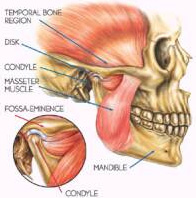
The jaw joints are ball-in-socket joints, just like your shoulders. When ball-in- socket joints are functioning properly, the ball and socket do not touch because a thin disk of cartilage is located between the ball and socket. This disk of cartilage is held in place and guided by muscles. When the jaw opens, the disk glides along with the ball joint of the jaw, and upon closing, it glides back into the socket, always providing a cushion between the ball and socket of the joint. When your jaw is at rest, the teeth are open and your jaw hangs slightly like a hammock. The disk is free of pressure and the jaw muscles are relaxed. Clenching or grinding your teeth puts a lot of constant pressure on the jaw joint. This constant pressure on the cartilage disk can cause it to warp and distort. Over time, permanent distortion of the disk can cause the jaw joint to make popping and clicking sounds.
Wearing a biteguard at night prevents the upper and lower teeth from touching and positions the teeth in their most correct and least traumatic position. It allows the jaw to be in a restful position. A biteguard can eliminate tension headaches or pain in the neck, shoulders and jaw and reduce the destructive effects of tooth on tooth contact from clenching or grinding.
